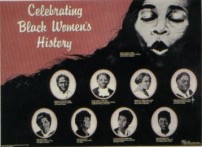|
|
||
Black History Month, February 2005, 2006with a special focus on African-American women, and women and race |
|
|
|
African-American
women in history, 2006 See
our appreciation of Shirley
Chisholm |
| From
Slave Women to Free Women: The National Archives and Black Women's History
in the Civil War Era By Noralee Frankel, 1997 African American Women: 1901-1950 Black women in the earlier 20th century, during a time of great social change. Includes the Harlem Renaissance, World War II, more. On a large resource site (about.com) offering brief profiles and further links on well-known (or should be) women, but many are named and not linked with information.(Much information but some obnoxious sponsors and ads - editor's comment). The three following links are also from this site: African American Women: 1951-2000 http://womenshistory.about.com/library/bio/blbio_list_afram.htm Women of the Harlem Renaissance Women in The West: Syllabus for Readings in Western Women's History from Spring 1993, but still lots of interesting references Louisiana Black Women: An Ignored History by Jan Doherty (This paper was selected by the Department of History as the Outstanding Paper for the 1985-1986 academic year.) "There is an aspect of the history of Louisiana that has been essentially neglected. The role of women, particularly the contributions of the black woman, is all but eliminated in the texts that attempt to outline the achievements of explorer, governor, and merchant in the development of Louisiana. Historian Gerda Lerner notes that "the modern historian is dependent on the availability of sources. The kind of sources collected depends to a large extent on the interests, prejudices and values of the collectors, archivists and historians of an earlier day." This observation was also made by W. E. B. DuBois in 1951 when he wrote, "We have the record of kings and gentlemen ad nauseam and in stupid detail, but of the common run of human being . . . the world has saved all too little of authentic record and tried to forget or ignore even the little saved." Such has been the case with the role of women in history. Arthur Schlesinger Sr. wrote in 1922 that "from reading history textbooks one would think half of our population made only a negligible contribution to history." The black woman has been ignored even more; she has been considered historically inferior to the white female in the United States and at the same time a member of an entire family of people that was considered little more than chattel for more than 200 years..." Black Domestics During the Depression: Workers, Organizers, Social Commentators By Phyllis Palmer "... Relief programs in the National Youth Administration (NYA) that trained teenage girls for adult roles mimicked the job options in the adult divisions of the WPA. Even with the advocacy of Mary McLeod Bethune, appointed with Eleanor Roosevelt's blessing to head a Division of Negro Affairs, the NYA sponsored programs that prepared girls for their race-specific, gendered roles. In southern states especially, white girls gained skills as future homemakers and housewives while black girls learned domestic service work. .." |
|
Mobilizing
for the vote, but -- Black Women Sent to the Back of the March ..."During
the late 19th century, numerous local Black women's service clubs were
formed. The Black club members found that they could not affiliate themselves
with the National Council of Women, the General Federation of Women's
clubs, nor could they be represented at the 1893 World's Fair. Inspired
by the ability of national clubs to tackle national issues, black women
came together to form the National Association of Colored Women (NACW).
Mary Church Terrell was the first President of the NACW..." |
|
||
A
few books of interest |
10 Books Essential for Women's History Month (from the Africana website) Short reviews with links for a good choice of recent and classic works. |
|
"When
and Where I Enter is an eloquent testimonial to the profound
influence of African-American women on race and women's movements
throughout American history. Drawing on speeches, diaries, letters,
and other original documents,Paula Giddings powerfully portrays how
black women have transcended racist and sexist attitudes--often confronting
white feminists and black male leaders alike--to initiate social and
political reform. From the open disregard for the rights of slave
women to examples of today's more covert racism and sexism in civil
rights and women's organizations, Giddings illuminates the black woman's
crusade for equality. In the process, she paints unforgettable portraits
of black female leaders, such as anti-lynching activist Ida B. Wells,
educator and FDR adviser Mary McLeod Bethune, and the heroic civil
rights leader Fannie Lou Hamer, among others, who fought both overt
and institutionalized oppression." |
 |
|
Sisters
in the Struggle: African-American Women in the Civil Rights-Black
Power Movement. |
 |



